Undervalued cars are vehicles that sell for less than their true market worth. Auctions often become the perfect hunting ground for these hidden deals. Why? Because most buyers overlook them, or they don’t know what they’re worth.
Who gets the biggest win? Smart car flippers looking for fast profits. Collectors who know rare trims and older models. Even regular folks on a budget can score big.
In this guide, how to find undervalued cars at auctions, what makes them sell cheap, and how to avoid common traps. Want to find a $12,000 car for half the price? Let’s dive in.
What Are Undervalued Cars at Auctions?

An undervalued car sells below what it’s worth. It still runs fine, or close to it, but the price doesn’t reflect the car’s real market value. Sounds like a dream, right?
So why does this happen?
- Cosmetic Flaws – Buyers skip cars with dents, scratches, or faded paint. But here’s the catch: these issues usually don’t affect how the car runs.
- Low Demand – Not everyone wants a brown sedan or a base trim without tech. But if you don’t mind, you might grab it at a steal.
- Unknown History – If the car has missing service records or unclear ownership, bidders hesitate. That lowers the price fast.
- Poor Listing Exposure – Some cars get buried in the middle of long auctions. Others show up with bad photos or vague descriptions. Fewer eyes mean lower bids.
- Niche Appeal – A rare trim, manual transmission, or oddball model might not attract everyone, but it could be a jackpot for the right buyer.
Why Cars Get Undervalued at Auction

1. Incomplete or Missing History
Buyers don’t like guesswork. When a car has no service records, missing titles, or gaps in ownership, most people back off, that’s your window. These cars often sell for 30% to 50% less than their dealer price. Imagine picking up a car that sells for $12,000 at a dealership, but winning it at auction for just $6,000.
Would you take that risk if you could check the basics yourself?
2. Minor Cosmetic Flaws
Most people walk past cars with a scratch, a small dent, or faded paint. But those things rarely affect how the car drives. A simple paint buff or dent pull could cost you $200, and raise the car’s resale by $1,000 or more.
Are you willing to look past the surface?
3. Low-Attention Listings
Some great cars get listed at the worst times, late in the auction, stuck between big-name models, or shown with blurry photos. Others come in unpopular colors or trims that scare away casual buyers. These low-attention listings often fly under the radar.
Look for the sleepers, the ones no one’s watching.
4. Niche or Enthusiast Models
Not everyone wants a manual wagon, a turbocharged hatchback, or a base-model pickup with no power windows. But gearheads and collectors know the real value of these oddballs. When few people understand a car’s worth, prices drop fast.
Know your niche, and you’ll know where to find gold.
Auction Industry Snapshot (Key Stats)
The auto auction world moves fast, and involves serious money. Want proof? Just look at these real numbers:
- $110.6 billion in annual auction sales in the U.S.
- 60.7% of auctioned vehicles actually sell
- Cars with unclear history often go for 30–50% below dealer prices
- Prices dropped 9.6% year-over-year but still sit 34% higher than in 2019
- Auction volume dipped during the pandemic but now shows strong signs of recovery
What does this mean for you? The opportunity to find real value is still alive, if you know where to look.
Proven Strategies to Spot Undervalued Cars

1. Do Your Homework
Check current market prices before you bid. Use tools like Kelley Blue Book, Edmunds, or AutoTrader to compare auction listings with private sales or dealership prices.
Run a VIN check on any car you’re eyeing. A quick report shows past accidents, title status, or mileage rollbacks.
Dig into the car’s known issues. Does that model blow head gaskets often? Burn oil? If you know what usually goes wrong, you’ll know what to look for at the lot.
2. Inspect Thoroughly
Show up early. You need time to walk around, open hoods, and pop trunks.
Use a flashlight to spot leaks, fluid stains, or rusty parts. Smell the cabin, musty air or burned oil could hint at bigger problems.
Check for gaps in body panels, mismatched paint, or crooked trim. These signs often point to past crashes.
Read the auction’s condition reports line by line. If they note damage or pending repairs, factor that into your bid, or walk away.
3. Read the Auction Room
The smartest buyers don’t rush in. They watch first.
Look for cars placed in the middle or end of the auction. These often get less attention as buyers tire out.
If you see three similar cars in a row, the first usually gets high bids. The third? Not so much. That’s where value hides.
See a bidder throwing down offers on everything? They might be trying to drive up prices. Sit back, spot patterns, then pounce when the time’s right.
4. Set and Stick to a Budget
Before the auction, decide your maximum bid based on market value and condition.
Then add in the extras:
- Auction house fees (sometimes 10–15%)
- Transport to your location
- Any repairs or safety checks you’ll need right away
Once you hit your limit, stop. Don’t let adrenaline drain your wallet.
5. Think Long-Term Value
You don’t just want a car, you want potential.
Find cars with easy cosmetic fixes like scuffed bumpers or faded headlights. A few hours of detailing can raise value fast.
Search for rare trims, manual gearboxes, or unusual colors that appeal to collectors or enthusiasts.
Cars with clean service records often sell higher, even if they’re older. Look for paperwork. It matters.
And if you know how to restore or upgrade, even better. A small project car today could bring a big return tomorrow.
Special Opportunities: Hidden Gems to Watch
Ex-Fleet or Lease Returns
Big fleets and lease companies rotate cars out regularly. These vehicles often have full service records, regular oil changes, and low starting bids.
Even better? They’re usually less than five years old and still run strong.
Classic or Early-Generation Models
Most buyers skip older cars, but you shouldn’t. A clean early-gen model, or an overlooked ‘90s sedan, could become a future classic.
Why wait until it shows up on collector lists? Buy when no one’s paying attention.
Common Mistakes to Avoid
Even experienced buyers slip up at auctions. Don’t make these mistakes:
- Bid with emotion – Excitement clouds judgment. Stick to your numbers or walk away.
- Skip inspections – Auction cars sell as-is. That means no returns, no warranties. If you don’t check for leaks, frame damage, or engine trouble, you may drive home a headache.
- Ignore fine print – Each auction has its own fees, rules, and payment deadlines. Miss one, and you could lose the car, or pay more than expected.
Ask yourself this: Would you buy a car in the dark without reading the rules?
Final Tips for Success
Want to win big at auctions? Keep these final pointers in mind:
- Attend first, bid later – Watch a few auctions before raising your hand. Learn the rhythm, spot the pros, and notice which cars get skipped.
- Bring a pro – A mechanic or experienced buyer sees things you miss. Two sets of eyes always beat one.
- Know the auction rules – Some houses charge 10%, others 15%. Some give 24 hours to pay, others demand full payment same day. Always check the terms.
- Value paperwork – A clean title, full service history, and inspection reports tell a bigger story than shiny paint.
Smart buyers look for more than just a price tag. They look for proof.
Conclusion
The best deals don’t go to the boldest bidders. They go to the most prepared ones.
Learn the market. Set your budget. Know what the car is worth before you show up. And always, always check the details.
Start small if you’re new. Pick cars with minor flaws and easy fixes. Watch prices, read listings, and think long-term.
Your next great car, or your next flip, might be just one auction away.
FAQs
- What is an undervalued car at an auction?
An undervalued car is a vehicle sold for less than its actual market value. At auctions, this usually happens due to cosmetic flaws, unknown history, or low bidder interest. - How do I know if a car is undervalued at auction?
Compare the auction price with listings on Kelley Blue Book, Edmunds, or AutoTrader. Look for models with minor flaws, unpopular trims, or missing service records, these often go for 30–50% less. - Why do some cars sell so cheap at auction?
Cars sell cheap due to incomplete paperwork, bad photos, cosmetic issues, or poor timing in the auction lineup. Bidders avoid risk, which creates price drops for informed buyers. - Can I find good cars with unknown history at auction?
Yes, but only if you inspect the vehicle thoroughly and run a VIN check. Many cars with missing records run fine and sell well below dealer prices. - What are the best websites to check a car’s value before bidding?
Use Kelley Blue Book (KBB), Edmunds, and NADA Guides to check trade-in, private party, and dealer values before setting your max bid. - Should I bring a mechanic to an auto auction?
Yes. A mechanic can spot leaks, frame damage, and engine issues that most people miss. Their input helps you avoid buying a lemon. - What auction fees should I expect?
Most auctions charge 10–15% buyer’s premiums, plus admin fees. You may also need to pay for transport and repairs right after purchase. - Are ex-fleet or lease return vehicles worth buying?
Absolutely. These cars usually have full maintenance records and lower starting prices. They’re great options for flippers or budget-conscious buyers. - What’s the biggest mistake buyers make at car auctions?
Bidding emotionally. Many buyers overpay when they chase cars they “have to have.” Always set a budget and walk away when you reach it. - How much profit can I make flipping a car from auction? It depends on the car and repairs, but many flippers make $1,500–$5,000 per vehicle when they buy undervalued cars and resell at retail prices.




